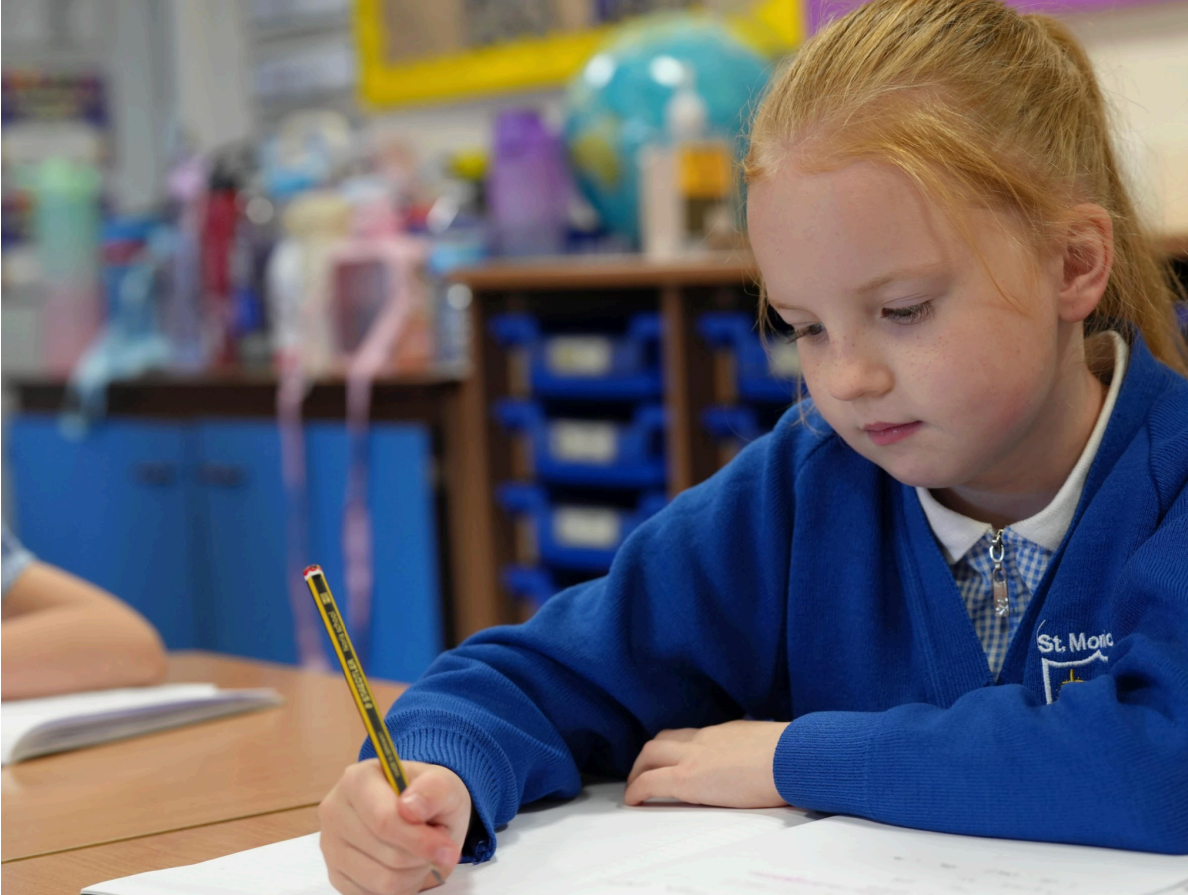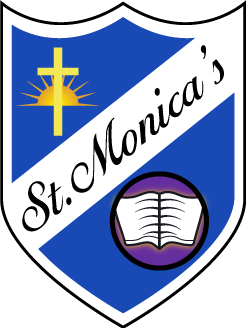English

English at St. Monica’s
Substantive Knowledge
In reading, substantive knowledge is the ability to decode and sight-read words. To begin with, they will need a secure knowledge of phonics. This means that they will be able to hear phonemes, identify digraphs and trigraphs and match the sounds to individual letters and groups of letters (phoneme-grapheme correspondences). They will then apply these skills to blend the sounds of letters together to decode unfamiliar or unknown words. They will also need to sight read a range of tricky words to enable them to become fluent readers. As they progress in their reading, children will begin to automatically recognise words, reading with automaticity and pace. This provides children with opportunities to read for pleasure, including reading and reciting poetry, and helps them to develop their vocabulary. Children are then able to apply their knowledge of reading strategies to comprehend a range of texts.
In writing, substantive knowledge includes understanding of structural, grammatical and linguistic features, as well as knowledge of handwriting and spellings. Children will begin with developing the knowledge of how to structure a simple sentence, using accurate punctuation, and will then learn how to combine sentences to form paragraphs to suit different writing genres. Through deliberate practice, this substantive knowledge becomes automatic and fluent, and children become confident in effectively planning, drafting, and constructing writing for different purposes.
Disciplinary Knowledge
In both reading and writing, disciplinary knowledge is the process of thinking critically and creatively using the automaticity of substantive knowledge. Once children are fluent readers, who can understand what they have read, they begin to develop their disciplinary knowledge in reading. This also applies to writing: once children can confidently structure sentences using accurate punctuation and grammar, they are able to develop disciplinary knowledge in writing.
In reading, this involves the ability to interpret different texts, drawing upon knowledge of language and literary conventions. It involves the skills of supporting an opinion, based upon evidence within the text, and comparing and contrasting books from a range of genres, written by a variety of authors. Children will develop the skill of comparing themes, drawing upon extracts from the text to back up arguments and discussions and evaluating the intentions of the author, and expressing personal preferences.
In writing, disciplinary knowledge is the ability to evaluate and edit text and apply substantive knowledge to effectively write for a range of purposes. Children will be able to adapt their writing to suit different genres and audiences, making careful language and grammar choices. They will be able to edit and re-draft their writing, using tools such as dictionaries and thesauruses to help them. Children will carefully structure their writing in such a way as to engage the reader, maintaining their interest throughout.
Intent
In St. Monica’s, our intent is to equip all pupils with skills, enthusiasm and determination to achieve their full potential. We aim to foster a life-long love of learning in order to prepare our pupils for the future. We have aspirations for our pupils and want them to have high aspirations for themselves. Education is a life chance with communication and language providing foundations for learning, thinking and well-being. Evidence indicates that success in literacy relies on the secure development of language and these skills are amongst the best predictors of educational success (Educational Endowment Foundation, 2020).
Supporting our pupils’ language is a priority. Language and literature underpins everything that we do. In order to cater for the needs of our school community, we ensure that all pupils engage in enrichment activities to broaden their experiences. At St. Monica’s, we provide a carefully planned and progressive curriculum which is enjoyable, purposeful and meaningful. As a result of this, when our pupils leave school, they are equipped to meet the challenges and demands throughout the next phase of their learning journey. Successful language takes place when reading, writing, speaking and listening are integrated in a supportive and stimulating environment in which independent and reflective and critical thinking is fostered.
SEND adaptations
Reading Schemes and Phonics
Implementation
In St. Monica’s, we follow a mastery approach to delivering the National Curriculum for English with the Education Endowment Foundation research at the heart of this. The Pathways to Literacy programme is used as a vehicle to ensure a progressive whole-school approach to the teaching of English. All elements of spoken language, writing, spelling and grammar, and comprehension are interlinked through the use of high-quality texts and engaging activities.
Speaking and Listening
The foundations of literacy are laid in the years before our pupils come to school. At St. Monica’s, we build on pupils’ existing knowledge and extend the natural learning process. Our pupils come to school having learned to talk. We provide context for learning that will enable them to develop control over language and enjoy using it so that they can interact effectively in a literate society. We do this by:
- Providing enrichment activities to stimulate interest and extend pupils’ vocabulary.
- Exposing pupils to high-quality texts with a rich and varied content in order to model language.
- Ensuring all literacy activities are rooted in oral language.
- Staff acting as a model to develop pupils’ speaking and listening skills.
- Engaging pupils in a variety of talk to share and extend their thought processes.
- Identifying pupils who experience difficulties with their receptive and/or expressive language and targeting them for further specialist assessment with carefully matched intervention put in place.
English as an Additional Language (EAL)
We recognise the diversity and richness of experience and expertise that children bring to our school. We understand that they need to have the freedom to use their own languages and to code-switch when necessary. We do this by:
- Actively fostering the supportive attitude of peers.
- Giving additional scaffolding and adaptations as appropriate.
- Providing additional time and support so that our pupils do not feel pressurised.
- Using open-ended questions to ensure sharing and construction of meaning.
- Networking with local agencies, such as: Complimentary Education Service of Sefton Council
- Providing dual-language books
Reading
We have a strong emphasis on the integration of the spoken and written language where pupils are encouraged to take control of their reading, reflect on their reading and be aware of strategies for reading. We do this by:
- Reading to our pupils every day and sharing our enjoyment of reading.
- Exposing our pupils to a variety of high-quality fiction and non-fiction material.
- Creating a supportive language environment where pupils experience reading as a rewarding encounter and positive attitudes are modelled and promoted.
- Providing high-quality reading material for our pupils to access in our class and school library with timetabled sessions.
- Explicit teaching and adult modelling of a range of strategies to gain meaning from texts.
- Our approach to the teaching of reading is carefully structured in line with National Curriculum expectations.
- Progress is monitored and used to inform next steps for learning.
Writing
Children learn to write and write to learn. We aim to create a love of writing and an appreciation of its value. In St. Monica’s, we focus on providing a variety of real situations that require the use of written language so that our pupils can develop a range of strategies and skills that will enable them to function in society as literate adults. We do this by:
- Engaging our pupils in written language tasks for a variety of purposes.
- Capitalising on opportunities as they arise incidentally to capture teachable moments.
- Providing opportunities for pupils to take active responsibility for their language learning in a supportive environment where the adults respond to the pupils’ needs and demonstrate how language is used.
- Demonstrating that writing can be thought of as a process made up of essential components. We model all stages of the writing process, including: planning, drafting, sharing, evaluating, revising, editing and publishing. Pupils then have support to practise, with feedback. Support is then gradually reduced as pupils take increasing responsibility.
- Formative assessment through marking, with targets discussed and set with pupils.
- Explicitly teaching spelling with diagnostic assessment focusing effort on the spellings that the pupils are finding difficult.
Impact
- Purposeful Listening: Effective communication will occur when a pupil has effectively gained meaning from what they have heard.
- Purposeful Talk: Effective communication will occur when a pupil has effectively relayed his/her meaning to the listener.
- Purposeful Writing: Effective communication will occur when the pupil has effectively relayed his/her meaning to the reader. Good spelling is a factor in effectively relaying meaning.
- Purposeful Reading: Effective communication will occur when a pupil creates, interprets and analyses meanings from a text.
The impact and measure of the effectiveness of English teaching at St. Monica’s is that pupils develop a toolkit of key skills that they can apply to speaking and listening, reading and writing. Effective communication is achieved through these purposeful language interactions. Our pupils leave St. Monica’s best equipped for the next phase of their educational career with confidence and positive attitudes to embrace future challenges.
